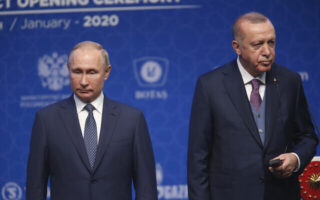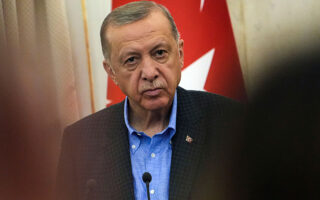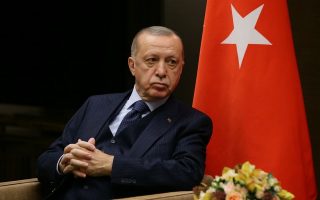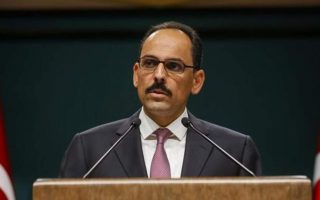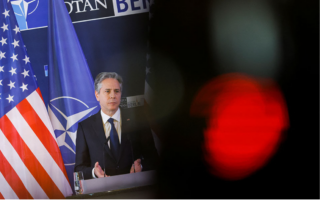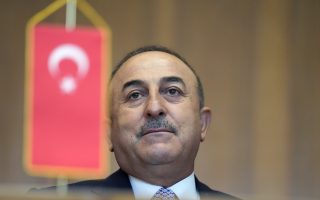Speaking out from a Kyiv shelter
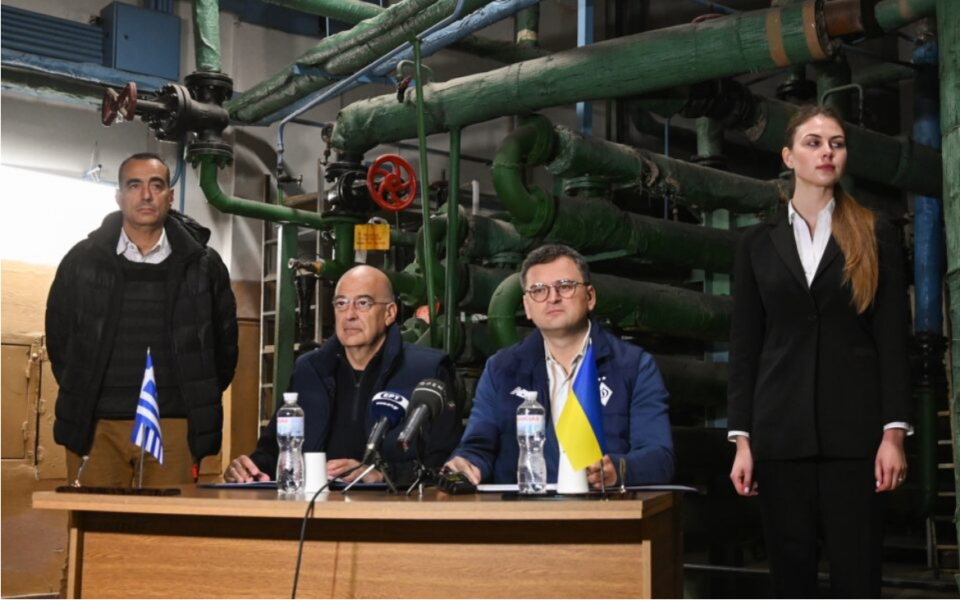
A few days ago, I visited Kyiv, my third trip to Ukraine following the Russian invasion. I had already visited Odesa, where the Greek War of Independence was incubated, twice. In Kyiv, next to the train station, we encountered buildings destroyed the previous day by Iranian drones. No one could anticipate such a sight in a European capital in 2022. The meeting at Ukraine’s Foreign Ministry, too, was not spared by the emergency conditions prevailing in the country. We had to descend to the air-raid shelter when the alarm sounded and continued our talks there.
It was the first time in Greece’s history that a memorandum of cooperation had been signed in an air-raid shelter during a bombardment. We lived unheard-of moments shortly afterward, when, walking the streets with my Ukrainian counterpart (Dmytro Kuleba), I witnessed a society trying to cling to normality in wartime. The visit offered multiple messages to many.
Firstly, I represented the European Union, providing real support to a Ukrainian society trying to survive at a time when other European officials were canceling their visits. Showing that we do not succumb to fear. And showcasing the values we European societies profess: respect for international law and the freedom of peoples to decide themselves on the present and future of their countries; our absolute and unwavering position on defending the integrity of national borders, as they have been shaped through international agreements and treaties. Having formed an opinion on the events on the ground and not by watching them on TV, an intervention on the EU Council of foreign ministers carries more weight.
Secondly, there is an important Greek community living in Ukraine and it is suffering. It is very important to show the presence of the Hellenic Republic on the ground and express, in deeds, our interest in this community’s well-being and our concern for its present and future. I met the rector of Mariupol State University, a professor of Greek studies, under conditions that could not be more different than those of our last meeting, 10 months ago, in Mariupol itself, a city that no longer exists. I expressed Greece’s readiness to support the promotion of Greek culture and Greek language acquisition and rescue this unique community. May I also note that President Volodymyr Zelenskyy thanked me for Greece’s support in the effort to include Odesa’s historical center in UNESCO’s World Heritage List. The Greek element has been present in Ukraine for centuries. It has suffered war and persecution. But it was not eradicated. And it is our duty to protect it to the best of our ability.
Thirdly, the bombarded Kyiv is, in a way, the perfect place to inform the global community about what we Greeks are facing. In my talks with my fellow foreign minister and President Zelenskyy, I became even more aware of the commonality of challenges we face. Both countries face large, aggressive neighbors on their eastern borders; both neighbors claim that our territories were wrongly claimed from past empires, the Russian and the Ottoman. For Greece’s and Ukraine’s eastern neighbors, borders do not exist, they are artificial and, therefore, openly contested. Both Greece and Ukraine supposedly control territories that are not our own: Crimea, Donbas, the Aegean islands. At best, our countries must exercise limited sovereignty on these territories by demilitarizing them. According to this revisionist narrative, our countries violate the rights of “ethnic” minorities.
Threats of invasion, which in Ukraine’s case did not remain mere threats, are combined with hybrid warfare using all means such as weaponizing migration and cutting off energy flows. The propaganda war and personal attacks against our countries’ leaderships are also part of this hybrid warfare.
Turkey has fully adopted Russia’s methods. It clearly warns, “Be careful, if you don’t want to become another Ukraine.” To this unprecedented provocation we face we respond: by highlighting Turkish aggression to allies and partners; building and enhancing our alliances with our European partners, the United States, the countries in our immediate neighborhood, as well as with emerging powers sharing the same values, such as India and Japan, always respecting the core principles of international law and the European acquis, the body of common rights and obligations binding all EU members. We express the challenges we face in Athens, Brussels, Washington and elsewhere; but our voice takes an added urgency and gravity when we speak from an air-raid shelter in Kyiv.
From Kyiv, we conveyed a message that is difficult to ignore. That’s what infuriated Turkey. The message is simple: If not stopped, the actions against Ukraine will find willing imitators. The most moving moment for me was when my Ukrainian colleague repeated in front of the camera the rallying cry of the Greek War of Independence: “Freedom or death.”
This visit fulfilled its goals. Ukraine expressed its gratitude for our presence in Kyiv. Not coincidentally, my colleagues from countries such as Germany and Lithuania, who I met recently, were very understanding and supportive of the challenges we face.
Greece never misses an opportunity to prove that it is a pillar of security and stability in its wider region, its prestige and credibility globally enhanced.
Nikos Dendias is Greece’s foreign minister.
